- Home
- Patricia McLinn
Baby Blues and Wedding Bells Page 4
Baby Blues and Wedding Bells Read online
Page 4
Hearing that whistle, Fran felt fully justified in taking the slight detour that gave him the full impact of the renovations. She’d hoped it would take his mind off waiting for answers.
Okay, maybe she also wanted a ta-da! moment of showing off what the Bliss House committee, along with Trevetti Building’s construction crew and volunteers, had achieved.
“I can’t believe it,” Zach said. “I remember a place that looked like it might sink into the ground any second.”
“And you didn’t see it at its worst. Miss Trudi simply couldn’t take care of it—not physically and not financially. But no one could get through to her that she needed help, not for the longest time. Annette and Steve together finally had to lay it on the line—she could lose Bliss House and her independence for good if she didn’t let some of us help her.”
“How was she going to lose her independence?”
She spoke carefully. “Some people in the community believed that Miss Trudi would be better off in a retirement home and Tobias would be better off without Bliss House.”
Zach faced her and said one word: “Lana.”
Either she hadn’t been oblique enough, Fran thought, or he knew his mother quite well, even after this time apart.
“Yes.” No sense sugarcoating it. She doubted Zach would buy it anyway. “She headed a group that was pushing to tear down Bliss House, with plans to develop the site.”
He cursed under his breath. “Some concrete block devoted to making even more money she didn’t need.”
“I don’t know the details.” From what she’d heard, he was close, but she could see no good coming from confirming his worst opinions of Lana. “But with Annette and Steve leading the way, people came together and got behind this alternative solution for Miss Trudi and Bliss House.”
“Steve’s got Annette doing the Corbett duty thing in looking after the town, huh?”
She stopped in the drive and gave him a level look. “There is nothing wrong with wanting to help your town. And in this case, it’s Steve’s job. As I told you, he’s town manager—actually the whole county.”
“So he never became a lawyer like Lana planned?”
“No.”
She watched another piece click into the new vision he was forming of his family.
“Steve’s led Tobias in a real upswing,” she said over the top of the car as they closed their respective doors. She pulled her work gloves from a back pocket. “If you go to the lakeside—”
“I saw. Moved the pier. Buildings spruced up. New businesses. It cleaned up nice. That’s Steve’s work?”
“Yes. He brought in more jobs, too. But some of the older people could use financial help and others need to work at home. The crafts center at Bliss House will let them sell what they already make. Plus, it’ll bring more visitors to town.”
She led him down the drive that curved between the brick wall that enclosed Miss Trudi’s domain and a low wall that set off the patio outside the main house. Workers could be seen inside through windows that still wore manufacturers’ stickers.
“So show me these gardens you’ve been working on so hard.”
“It’s not a precise re-creation, of course.”
“You’re kidding. With all that stuff you have, I’d think you were intending to put back every blade of grass.”
She made a face at him. “Hardly. For one thing, we didn’t want to take down mature trees, which we’d have to do to qualify as restoring or reconstructing. The trees the Bliss family planted would have been young in 1890. The elms—” she swept her arm toward the entryway from the street “—can’t be replaced and the drive needs to be wider, so we’ll have planter boxes on the brick wall. We can change those seasonally, and they’ll provide visual interest. It’s like what we’re doing with the house—adapting what’s historical to modern use.
“Miss Trudi’s quarters being enclosed makes the whole design different, too.” She gestured to the miniature compound where Max and his workers had converted and connected several old outbuildings to create a safe and modern home for Miss Trudi.
“Originally there was a conservatory with exotic plants, but there’s no way we can afford that yet. In fact, we can’t afford many of the specimen plants I’d like.” She sighed. “Most of the paths are in. Ghost marks of their design showed up on those photos I took, and once I got in among the plants, I could really see the original design.”
He touched a finger to a healing scratch on her forearm. The scratch abruptly burned even more than it had when she’d done it.
“Looks like you’ve been getting into the plants too much, Fran. But what I’m wondering is what I’m going to do to earn my keep? You’ve got most of it finished.”
“We have trees and shrubs arriving next week. And then we have very special trees being delivered. All of them must be planted.”
“Special trees?”
She ignored the lilt of mockery in the question. Or was it amusement?
“A descendent of Bliss House’s original head gardener has trees on her family’s property descended from the maples planted in the four corners of the grounds here. She’s offered to donate several. We can’t afford to move a huge one, but we’re going to take a five-inch diameter tree to plant in place of the one corner tree that’s died, then two smaller ones.”
“Doesn’t sound bad. I can get that done tomorrow.”
“No, you can’t.”
That stubborn glint in his eyes intensified.
She held up a hand. “You can’t go charging in, Zach. There’s a lot going on here and we have a daily schedule worked out right up to the opening in less than three weeks. If you’re serious about working for your room, you’ll do things when I say. If you can’t take orders…”
He leaned back, examining her. She wanted to squirm, to turn away, to do anything but stand still and firm. She stood still and firm.
“I can take orders,” he said. This tone she truly couldn’t interpret. Not stubborn exactly. There was some pride, but not on the surface. “If they’re reasonable,” he added.
“I’m always reasonable.”
He laughed. Not the throw-back-his-head-and-let-it-all-out laughter she remembered from a young Zach, but the first undampened amusement he’d shown since he’d walked up the sidewalk earlier this afternoon.
The thing was, it was the plain truth. She was reasonable right to her core. Reason and calm—those were Fran Dalton’s strengths. Everyone knew that. And she’d learned the penalty for straying from those strengths.
“So what’ve you got to keep me busy until these trees and shrubs get delivered?”
She smiled. “Oh, I’ll keep you busy. We’re going to be planting many smaller plants, as well as bulbs for next spring. The Garden Club ladies have generously volunteered to help, but I don’t think seven women pushing seventy or more can handle the volume. We have an order of nearly four hundred tulip bulbs coming because they’ll provide such dramatic color the first season and—”
“Okay, okay, so you do need me.”
Chapter Three
It was windy. The kind of wind Zach associated with Wisconsin. A straightforward blow from west to east. No fancy shifts and swirls.
It almost took the weed out of Fran’s gloved hand as she straightened from plucking the interloper from underneath a bush she informed him was a viburnum carlcephalum.
Having nearly completed their circuit of Bliss House, with Fran explaining Victorians’ gardening likes and dislikes all the way around, they were in a back corner with a couple of empty raised beds in the middle and a line of bushes around the outside.
He could have told her to point him to where she wanted a plant stuck and he’d get it done, but it seemed rude to interrupt her enthusiasm. Besides, she was fun to watch, with her face all serious while her hands drew patterns in the air.
Not to mention his enjoyment when she bent over the way she’d just done to snag an errant weed. Now that was definitely worth watch
ing.
“Bliss House originally would have had a much larger kitchen garden to supply the household all year round, as well as herbs for medical purposes. Not to mention fruit trees and shrubs. But the flower gardens will draw more visitors. So the kitchen garden’s a sample of what they would have had. We dug out most of the raspberry, currant and blueberry bushes.”
“So there’s no more work to be done with them, right?”
She gave him a quizzical look, apparently catching something in his tone. “That’s right.”
“Good. Because that’s one thing I won’t do. Nothing to do with raspberry bushes.”
Her brows rose. “Are you allergic?”
“No. The berries are fine. It’s the bushes.”
He watched a slow shifting of her face, her cheeks lifting, her lips curving, and then all the changes resolving into a grin. A genuine face-shifting, sassy-as-hell grin.
“You’re afraid of raspberry bushes? Zach Corbett is afraid of raspberry bushes?”
“Not afraid,” he said with dignity. “A healthy respect, combined with a desire to keep my digits and limbs attached and not get sliced to bits. You know that expression about death by a thousand cuts? That’s really about raspberry bushes.”
“But…you and Steve and Rob used to go raspberry-picking as kids. Rob’s talked about that—riding your bikes over to that thicket by the river, and eating raspberries until you were stuffed.”
“Yeah. Well, guess who got to do most of the picking because he was the smallest and supposedly could fit in better? I used to get pretty damned torn up.” A faint grin touched his lips. “Along with my clothes.”
“So they picked on the youngest, huh? Then why did you keep going?”
“Because they were the big kids. I had to keep up and I had to pick the raspberries—those were the conditions before I could go.”
“Aw, poor Zach.” Her grin stayed sassy.
“That’s right,” he said, deadpan. “Finally someone realizes it. Folks thought being me was an easy gig, but there were definitely drawbacks to growing up Zach Corbett of Corbett House.”
He’d expected more teasing for his poor-pitiful-me tone. Instead, she said, without an ounce of pity, “I know.”
She made it such clear-eyed fact that an urge to tell her—tell her about his leaving Tobias, what he’d been doing and why he’d come back—hung in his mind like a bright balloon.
“Besides,” he said, letting the balloon drift away on the breeze, “coming home after raspberry-picking with my clothes and me all torn up drove Lana wild.”
The wind swept the loose tendrils of Fran’s hair back, pressed her clothes against her body. She reached to tuck a vine into a trellis, and the fabric of her jeans plastered her calves and stretched taut over the long curve of her thighs. The tail of her shirt flipped up, revealing a flat stomach and a tiny triangle of pale skin above her waist. Across her ribs, the shirt flattened, then swelled with the curve of her breasts, defining their full outline as clearly as a sheet might to a lover’s eyes.
And then she went after another weed. This time she didn’t crouch, but bent from her waist to reach over a bushy plant and grab the tall weed behind it. The position pulled those tan jeans tight over a firm rump stuck up in the air.
He swore to himself. Under those utilitarian work clothes, Fran Dalton had the kind of body that men who weren’t into sticks dreamed about. When the hell had that happened?
“What?” she demanded, half resigned, half belligerent.
With her backside still in the air, she was looking over her shoulder at him.
Only then did he realize he’d emitted a low whistle.
“When did you change?”
Fran partially straightened. In an effort to avoid the dirt caking her work gloves, she used her forearm to push her hair off her face, but she left a smear along her temple anyway.
“Change? How?”
“You used to be, uh, chubby. You’re not now.”
She straightened the rest of the way quickly, her cheeks tinged pink, and he didn’t think it was all from the position she’d been in.
“College.” She moved down the path ahead of him, keeping her gaze on the plants.
“Most people gain weight at college.”
She shrugged. “I’d been cooking for Dad and Rob, and keeping up with them at the table. When I went to school I wasn’t around food all the time and I didn’t have a couple of hollow-legged males to feed.”
He wondered, as he watched the breeze ruffle her hair over the smudge, if it had been as simple as she made it sound.
“Now what?” she asked, hands on hips.
He’d been staring at her.
Without answering, he closed the distance between them. Her expression didn’t change. It should have. She should have registered an awareness, a recognition of the potential intent of any sane male of a certain age who crossed into the personal space of a woman like her. She should have registered wariness. But not Fran Dalton.
Maybe that’s what spurred him to his next move.
He cupped the back of her head in his large left palm, feeling the heat of the sun on the soft surface of her hair, and the cool of the coming night in the depths below.
There, now her expression changed. But not to awareness or wariness. Surprise—yes, that was there. But more than that, confusion.
She still didn’t get the potential?
With his one hand holding her head, he touched the side of his other thumb to the center of her lips, then traced their outline with deliberation. Up from the dip in the center of her top lip, then down the gentle slope to the corner, where it tucked in, across the wide straight line of her bottom lip—no pouting here—to the opposite corner, up the corresponding slope of her top lip and home once more to that decided dip in the center. Temptation whispered to repeat the circuit. Slower, softer.
He jerked his hand up, using his thumb to catch the smudge near her temple and transfer the dirt from her fair, smooth skin onto skin still nicked and scratched.
He released her abruptly and stepped back.
“There,” he said, holding out his dirtied thumb as proof of what, exactly, he didn’t know. “That’s what.”
“Oh.” Her fingers went to her temple—not her lips, her temple—and rubbed. “Thanks.”
She didn’t know.
God, the woman didn’t know. Not what her body could do to a man, and not how to read the signs. It was a dangerous ignorance. Dangerous for men who might care about her. And dangerous for her if she encountered men who didn’t care about her.
Motion to the side caught his attention.
And there stood Miss Trudi Bliss, her hair grayer, but the purple smock, loose pants and tennis shoes eerily familiar, watching him with great interest.
Following the direction of his gaze, Fran turned, too. “Miss Trudi, good afternoon. Did you know Zach’s back?”
“Zach! How wonderful to see you!” the old woman said, as if she’d just spotted him. Removing gardening gloves nearly as dirty as Fran’s, she stepped around a gray cat and advanced quickly to throw her arms around him, hitting not far above his waist because of the differences in their heights, and leaving him to wrap his arms around her sloping shoulders.
He squeezed her, surprising himself. She’d been a tartar his entire childhood, yet he felt a well of affection for this distant relative—a great-aunt with some removes thrown in if he remembered Lana’s lectures on genealogy, which he’d tried his best not to.
The feeling of affection ebbed somewhat when Miss Trudi released him from the hug, but reached up and laid her palm along his cheek. From another angle it might have appeared to be a sweet gesture of welcome. But even if he hadn’t felt the decided firmness of the hold, he found himself directly in the line of fire of her sharp, searching eyes.
Miss Trudi patted his cheek with more muscle than necessary. “I am glad to see that you have come home finally, Zach.”
“I haven’t—”<
br />
“You are taller than when you left.”
“Yeah. But I haven’t come back for good. Just visiting.”
“And you chose to come to see me? I am touched, Zach. However, you do have obligations and issues awaiting you elsewhere in Tobias that are of more import than visiting me.”
“Zach’s going to stay awhile in Tobias,” Fran said before he could answer. “That’s why we’re here. He insists he wants to work while he stays at the house, and we certainly can use help with the planting.”
Miss Trudi looked from him to Fran. He didn’t doubt for a moment that she’d put together the pieces with fair accuracy—that he hadn’t been invited to stay at Corbett House and wouldn’t have accepted if he had been, and that Fran’s generosity had provided the solution.
When Miss Trudi’s gaze returned to him, Zach had the oddest flash of having a target painted on his chest. Which was nonsense. Considering what he faced with his immediate family, what could Miss Trudi possibly do to him?
“What a splendid idea, Fran,” the older woman said. “You most certainly do need assistance, and Zach is the perfect solution. Oh!” She gave a theatrical start. “That is if Zach is willing and able to do such hard physical labor. I seem to remember that as a boy he…” She fluttered a vague hand.
“Was a lazy good-for-nothing?” Zach asked pleasantly.
“Precisely.” Miss Trudi smiled broadly, as if he’d gotten the correct answer on a pop quiz.
“I can do the work. And I will. Besides, it seems to me that’s Fran’s concern, not yours.”
“Miss Trudi’s on the committee, too, and Bliss House is still her home—”
“You said she sold it to the town.” Zach cut across Fran’s words. “And you pointed out her new home on the way. You’re in charge of the gardens. Nobody else.”
If he’d hoped to rattle Miss Trudi—and to be honest, he didn’t know exactly what his goal had been in that little speech—he failed.

_preview.jpg) Almost a Bride (Wyoming Wildflowers Book 1)
Almost a Bride (Wyoming Wildflowers Book 1)_preview.jpg) Prelude to a Wedding (The Wedding Series Book 1)
Prelude to a Wedding (The Wedding Series Book 1)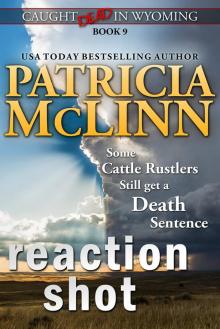 Reaction Shot (Caught Dead in Wyoming, Book 9)
Reaction Shot (Caught Dead in Wyoming, Book 9)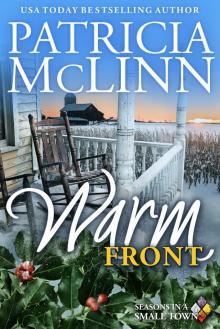 Warm Front
Warm Front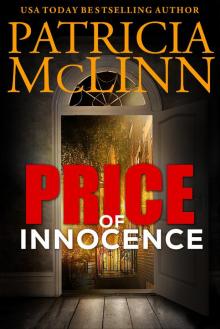 Price of Innocence
Price of Innocence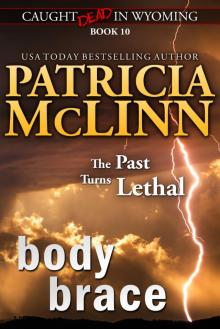 Body Brace (Caught Dead in Wyoming, Book 10)
Body Brace (Caught Dead in Wyoming, Book 10) Death on Covert Circle
Death on Covert Circle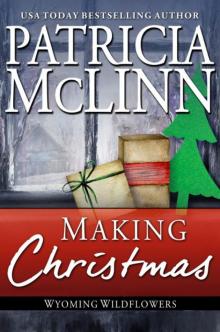 Making Christmas
Making Christmas Death on Torrid Ave.
Death on Torrid Ave. Death on the Diversion
Death on the Diversion The Rancher Meets His Match
The Rancher Meets His Match Widow Woman
Widow Woman The Runaway Bride
The Runaway Bride Hoops
Hoops A Stranger in the Family (Book 1, Bardville, Wyoming Trilogy)
A Stranger in the Family (Book 1, Bardville, Wyoming Trilogy)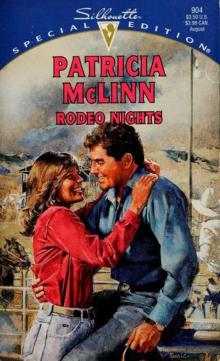 Rodeo Nights
Rodeo Nights Wedding Series Boxed Set (3 Books in 1) (The Wedding Series)
Wedding Series Boxed Set (3 Books in 1) (The Wedding Series)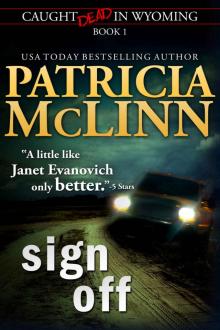 Sign Off (Caught Dead in Wyoming, Book 1)
Sign Off (Caught Dead in Wyoming, Book 1)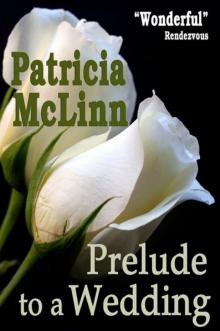 Prelude to a Wedding
Prelude to a Wedding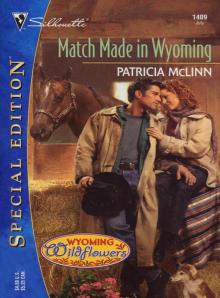 MATCH MADE IN WYOMING
MATCH MADE IN WYOMING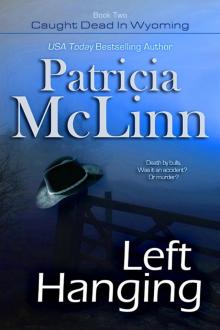 Left Hanging
Left Hanging What Are Friends For?
What Are Friends For?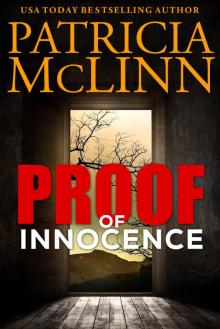 Proof of Innocence
Proof of Innocence Hidden in a Heartbeat (A Place Called Home, Book 3)
Hidden in a Heartbeat (A Place Called Home, Book 3) Baby Blues and Wedding Bells
Baby Blues and Wedding Bells Least Likely Wedding?
Least Likely Wedding? Heart Stealers
Heart Stealers Grady's Wedding
Grady's Wedding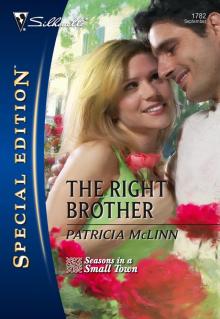 Right Brother
Right Brother Wedding of the Century
Wedding of the Century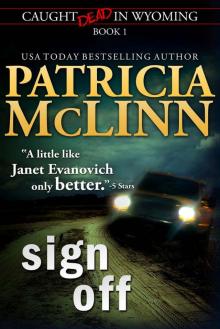 Sign Off
Sign Off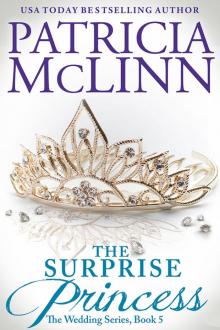 The Surprise Princess
The Surprise Princess Wyoming Wildflowers: The Beginning
Wyoming Wildflowers: The Beginning